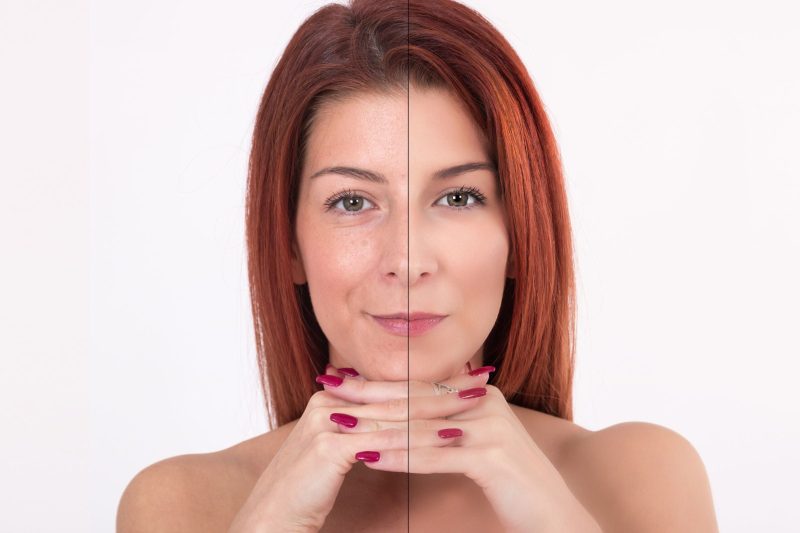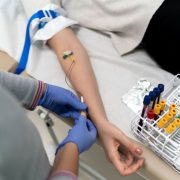Revitalizing Your Skin by Boosting Collagen Production
Posted on February 9, 2024 Written by: 100% PURE®
Collagen is the cornerstone protein in our skin. This protein is the secret sauce that keeps our skin bouncy, elastic, and downright youthful-looking. But as the years roll on and life happens, our collagen production takes a bit of a hit. Blame it on aging, throw in some environmental factors like sun exposure and pollution, and boom – collagen loss becomes a real concern. But don’t fret! The exciting part is diving into the world of skincare and wellness to tackle this collagen dilemma. Understanding why collagen is the rockstar of our skin and finding ways to amp it up again.
Collagen, a crucial protein in the human body, plays a fundamental role in maintaining the structural integrity and elasticity of various tissues, including the skin, tendons, and ligaments. Often referred to as the body’s scaffolding, collagen provides the necessary support for tissues to stay firm and resilient. However, as the inexorable march of time continues, the production of collagen undergoes a natural decline, particularly after a certain age.
In our youth, the body exuberantly produces collagen, contributing to the supple and vibrant appearance of our skin. Yet, as we age, typically around the late twenties or early thirties, this collagen synthesis gradually diminishes. This decline sets the stage for the emergence of visible signs of aging, including fine lines, wrinkles, and a loss of skin firmness. The most common causes of collagen loss are these:
Aging: Well, time waits for no one. As the clock ticks, our collagen production takes a bit of a dip.
UV Exposure: Sun, we love it, but sometimes it doesn’t love us back. Exposure to UV rays is like kryptonite for collagen
Unhealthy Lifestyle: Ever heard the phrase “you are what you eat”? Well, that applies to collagen too. Poor diet choices can impact collagen synthesis.
Smoking: Smoking is another collagen nemesis – it messes with blood flow, reducing nutrients that support collagen production.
Elevating collagen production naturally involves strategic dietary choices and optimal hydration. Key dietary components include incorporating vitamin C-rich foods, such as citrus fruits, berries, and bell peppers. Vitamin C plays a pivotal role in collagen synthesis, fostering skin resilience and elasticity. Additionally, leafy greens, rich in antioxidants and essential nutrients, contribute to collagen enhancement.
Hydration is a cornerstone in collagen support, influencing skin health profoundly. Water intake directly impacts skin hydration, vital for maintaining collagen structure and preventing premature aging. Integrating hydrating foods like cucumber and watermelon complements this, providing additional skin-nourishing benefits.
Healthy and youthful skin is often characterized by a robust collagen network, providing firmness and elasticity. Skincare ingredients like retinoids, peptides, and hyaluronic acid play a crucial role in promoting collagen production, contributing to a vibrant and resilient complexion.
Retinoids
Retinoids, derivatives of vitamin A, are renowned for their collagen-boosting properties. They stimulate collagen synthesis by promoting cell turnover, encouraging the production of new, healthy skin cells. This process helps reduce the appearance of fine lines and wrinkles, contributing to a smoother and more youthful complexion. Use 100% PURE Ginseng Collagen Boost Mask, it harnesses the power of ginseng and collagen-boosting ingredients to promote skin renewal, helping improve collagen levels and restore skin vitality.
Peptides
Peptides are amino acid chains that serve as building blocks for proteins like collagen. Incorporating peptide-rich products into your skincare routine can stimulate collagen production, aiding in the maintenance of skin firmness and elasticity. Use Mushroom Peptide Serum, it is infused with potent mushroom peptides, this serum supports collagen synthesis, promoting a plump and rejuvenated appearance.
Hyaluronic Acid
Hyaluronic acid is a hydrating powerhouse that not only keeps the skin moisturized but also supports collagen production. By maintaining optimal hydration levels, hyaluronic acid contributes to the skin’s overall health and resilience. Try Collagen Boost Sheet Mask, it combines the benefits of hyaluronic acid with collagen-boosting ingredients, providing a concentrated dose of hydration and promoting collagen synthesis.
Multi-Vitamin + Antioxidants PM Facial Oil
Rich in vitamins and antioxidants, this facial oil nourishes the skin and supports collagen production. Antioxidants protect collagen from damage caused by free radicals, promoting a more youthful complexion.
Vitamin C is a potent antioxidant known for its role in collagen synthesis. This product helps brighten the skin, reduce hyperpigmentation, and support collagen production for a radiant and even-toned complexion.
Over-the-Counter vs. Prescription Options
While over-the-counter products can be effective in promoting collagen production and improving skin texture, prescription treatments may offer more potent formulations. Prescription retinoids, for example, often contain higher concentrations, providing faster and more noticeable results in collagen restoration. However, they may also come with potential side effects and require careful consideration.
Newsletter Subscribe
for more blog updates and exclusive discounts
Professional treatments to restore collagen often include procedures such as laser therapy, microneedling, and radiofrequency treatments. These techniques stimulate collagen production, promoting skin elasticity and reducing the appearance of wrinkles for a more youthful complexion. Let’s take a closer look at how these treatments work:
Laser Therapy
How it works: Laser treatments use focused light energy to penetrate the skin and stimulate collagen production. Different types of lasers can target specific skin issues, such as wrinkles or pigmentation.
Benefits: Improves skin tone and texture, and reduces wrinkles and fine lines.
Considerations: Depending on the intensity, downtime, and recovery period may be required. Sun protection is crucial post-treatment.
Microneedling
How it works: Tiny needles create micro-injuries in the skin, triggering the body’s natural healing process and collagen production.
Benefits: Improves texture, minimizes scars, and enhances collagen formation.
Considerations: Mild redness and swelling may occur temporarily. Multiple sessions may be needed for optimal results.
Chemical Peels
How it works: Chemical solutions are applied to the skin, causing controlled exfoliation and stimulating collagen synthesis.
Benefits: Improves skin texture, reduces fine lines, and addresses pigmentation issues.
Considerations: Peels can vary in intensity, and recovery time depends on the depth of the peel. Sun protection is crucial during the healing process.
However, these procedures come with considerations and potential risks. Side effects like redness and swelling are common, and downtime varies based on treatment intensity. Skin sensitivity, especially for individuals with certain conditions, may lead to adverse reactions. Post-treatment sun sensitivity necessitates strict sun protection. Moreover, multiple sessions might be required, demanding a commitment of time and resources. A thorough consultation with a dermatologist is vital to assess skin suitability and set realistic expectations.
How Effective are Collagen Supplements in Restoring Facial Collagen?
Collagen supplements can contribute to the overall collagen levels in your body, including the skin. However, their effectiveness varies among individuals. Some studies suggest that collagen supplements may help improve skin elasticity and hydration, reducing the appearance of wrinkles.
Can Exercise Impact Collagen Production in the Skin?
Yes, regular exercise can positively impact collagen production in the skin. Exercise improves blood circulation, delivering nutrients and oxygen to the skin cells. Additionally, it stimulates the production of collagen and other compounds that contribute to skin health.
What is the Best Age to Start Using Collagen-Boosting Products?
The ideal age to begin using collagen-boosting products is around the mid-20s to early 30s when collagen production starts declining. However, it’s never too late to benefit from such products.
Are There Any Side Effects of Collagen-Boosting Skincare Treatments?
Collagen-boosting skincare treatments generally have minimal side effects, like redness or irritation. It’s crucial to patch-test new products, especially if you have sensitive skin. Additionally, consulting with a dermatologist before starting any new skincare regimen is recommended.
How Long Does It Take to See Results from Collagen Restoration Efforts?
Results from collagen restoration efforts vary. Some notice improvements in a few weeks, while others may take several months. Patience and consistent use of products or treatments are essential for optimal outcomes.
To restore and maintain collagen, embrace a holistic approach: enrich your diet with collagen-boosting foods, prioritize hydration, adopt a diligent skincare routine, and consider professional treatments. This comprehensive strategy promotes long-term skin vitality and resilience, enhancing your overall well-being.





